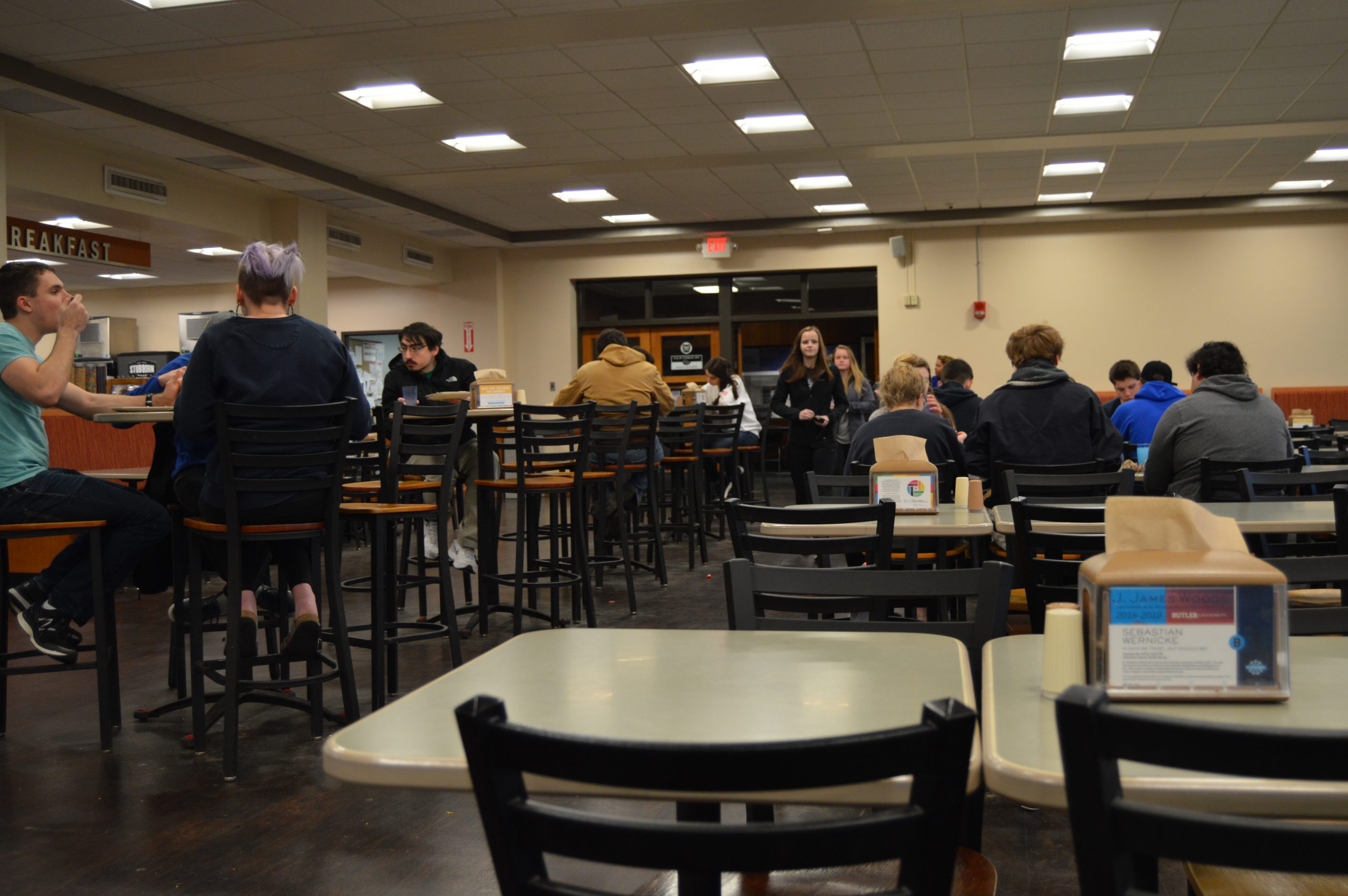Increasing number of students on campus have food allergies and require dining accommodations. Collegian file photo.
SHAWN WHEELER | STAFF REPORTER | stwheeler@butler.edu
According to Food Allergy Research and Education, FARE, the number of food allergies in American children increased by 50% from 1997 to 2011. These children are now becoming college students, placing a higher need on food allergy accommodations on college campuses than ever before.
Bon Appétit Dietitian, Katy Maher, said 23 first-year students have reached out to Butler dining services about their food allergies.
Bon Appétit, who is in its third year as the dining service on Butler’s campus, is working to provide dining accommodations for students in need.
Located to the right of the dining hall entrance, the Latitudes station is separated from the main kitchen and completely free from the top nine food allergens: milk, eggs, peanuts, tree nuts, fish, wheat, soybean, crustaceans and sesame. Maher said Latitudes is a great dining option for any student.
“On average, we see around 150 students every day at Latitudes between lunch and dinner service times,” Maher said. “Not all of these students are managing allergies, they just really like the food.”
The Latitudes station is not the only resource available for those trying to navigate severe food allergies. Bon Appétit also has a partnership with SDS to ensure that those with severe allergies receive the dietary help they need. Maher sees this partnership as one of the best parts of Butler’s allergy management process.
“Our partnership with SDS on identifying students with allergies is working very well,” Maher said. “It allows us to talk with students prior to arriving on campus so they feel comfortable navigating the café and asking questions from day one.”
Part of this SDS partnership is the option to be included in Bon Appétit’s Plated Program. Students who have their food allergies registered with SDS can fill out a Google Form selecting what they want for their meal off the daily Bon Appétit menu. After filling out this form, their requested food is then prepared separately from any other food that the student may be allergic to. Students may then pick up this food in a box at the Latitudes station.
Executive Chef Jordan Hall said in his 16 years with Bon Appétit, his training on food allergies has been extensive and has prepared him well for managing food allergies in the kitchen. Hall also has a daughter with food allergies and said his experience with her allergies helps him be more aware of food allergens in any product or recipe.
Maher said all the staff receive regular food allergy training and the information is consistently reviewed.
“Our café staff receives food allergy and celiac disease training twice annually,” Maher said. “This training is certified by FARE. Additionally, we have daily pre-shift meetings with our staff at all locations and food allergy training is regularly a part of those meetings.”
Bon Appétit is also adapting in real time to the latest food allergy research. Maher said one recent change to their food allergy management was the addition of sesame, recently identified as the ninth major allergen, to the café’s regular allergen training and its omission from the Latitudes station. She said this was just another result of Bon Appétit’s “constant contact with FARE.”
In addition to the amount of students that have already contacted dining services, it is possible that the amount of food allergies on campus is significantly higher. A study performed by the University of Michigan found that notification and communication of food allergies in college is very poor. In the study, 12.9% of students who reported having a food allergy said they had informed health services; 3.5% said they had informed dining services. This makes it much more difficult for college campuses to protect students from their allergens.
First-year youth and community development major Kaleigh Bendoff talked about concerns with sharing her food allergies with others. She was diagnosed with both a severe peanut allergy and celiac disease as a young child.
“It feels like it reduces my chance to be friends with people,” Bendoff said. “When I want to go out with friends, everyone has to work around me and my needs.”
There are a high number of allergic reactions that occur on college campuses, in part due to this fear of sharing with friends or staff. 42% of those who claimed to have a food allergy in the aforementioned University of Michigan study said they had experienced an allergic reaction since enrolling in college. In any given situation, these reactions can become fatal.
Despite Bon Appétit’s best efforts, Bendoff is also concerned about her lack of communication with dining services. She said she did not know at all about the opportunity to register her allergy needs with SDS. She said the Plated Program had been mentioned to her once when she first came to Butler, but she still has no idea how to sign up for the program. Bendoff said she would definitely look into these accommodations if she knew more about them.
Bendoff said that, overall, she “has been satisfied with how things have been run,” regarding food allergy management in the dining hall, but feels the communication about her dietary options could be improved.
“There is not enough communication directly to me about it,” Bendoff said.
Maher said any student with dietary restrictions should reach out to dining services and ask questions so they can help meet their needs.
Students can contact dietitian Katy Maher or Student Disability Services with questions regarding food allergies on campus. For general information, students can visit Bon Appétit’s website.



